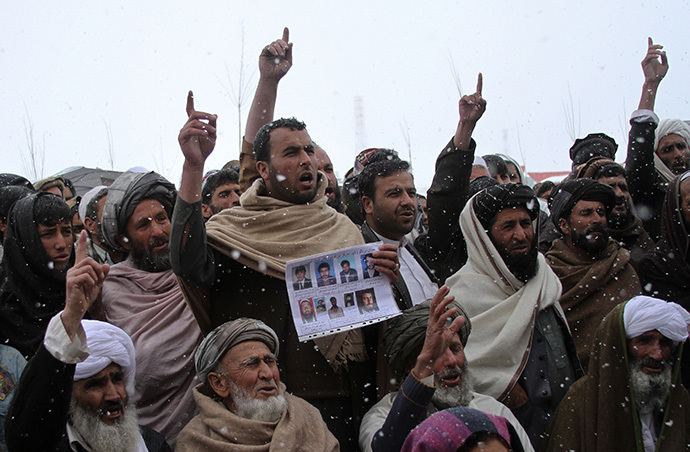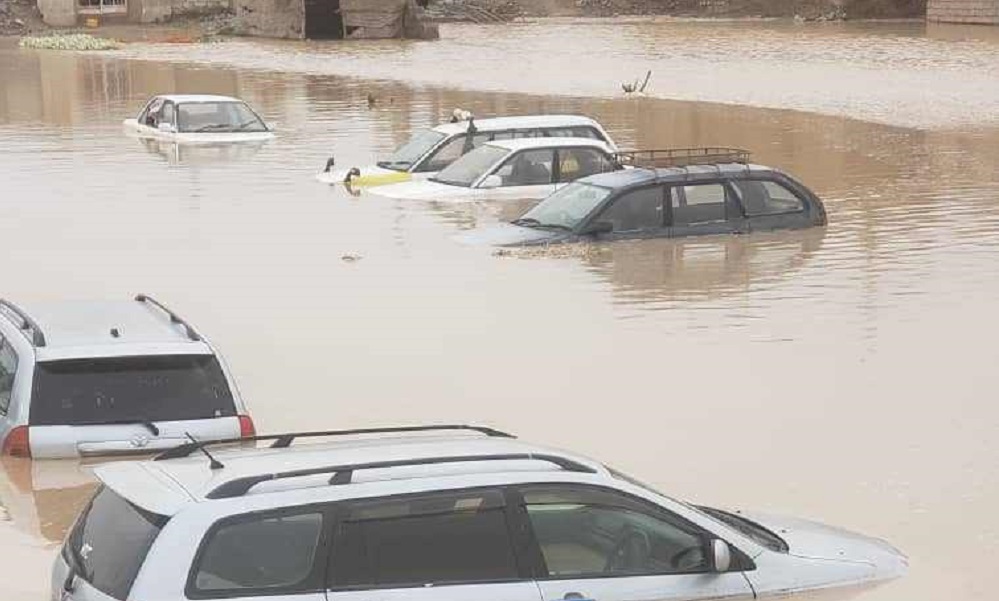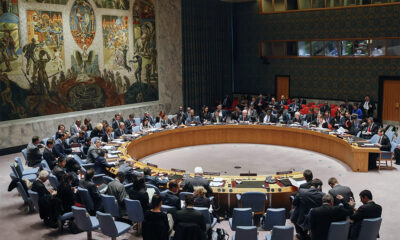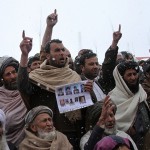Latest News
No Justice for Thousands of Civilians Killed in US/NATO Operations: Amnesty International

The families of thousands of Afghan civilians killed by US/NATO forces in Afghanistan have been left without justice, Amnesty International said in a new report released today (Monday).
Focusing primarily on air strikes and night raids carried out by US forces, including Special Operations Forces, Left in the Dark finds that even apparent war crimes have gone uninvestigated and unpunished.
“Thousands of Afghans have been killed or injured by US forces since the invasion, but the victims and their families have little chance of redress. The US military justice system almost always fails to hold its soldiers accountable for unlawful killings and other abuses,” said Richard Bennett, Amnesty International’s Asia Pacific Director.
“None of the cases that we looked into – involving more than 140 civilian deaths – were prosecuted by the US military. Evidence of possible war crimes and unlawful killings has seemingly been ignored.”
The report documents in detail the failures of accountability for US military operations in Afghanistan. It calls on the Afghan government to ensure that accountability for unlawful civilian killings is guaranteed in any future bilateral security agreements signed with NATO and the United States.
Amnesty International conducted detailed investigations of 10 incidents that took place between 2009 and 2013, in which civilians were killed by US military operations. At least 140 civilians were killed in the incidents that Amnesty International investigated, including pregnant women and at least 50 children. The organization interviewed some 125 witnesses, victims and family members, including many who had never given testimony to anyone before.
Two of the case studies — involving a Special Operations Forces raid on a house in Paktia province in 2010, and enforced disappearances, torture, and killings in Nerkh and Maidan Shahr districts, Wardak province, in November 2012 to February 2013 — involve abundant and compelling evidence of war crimes. No one has been criminally prosecuted for either of the incidents.
Qand Agha, a former detainee held by US Special Forces in Nerkh in late 2012, spoke of the daily torture sessions he endured. “Four people beat me with cables. They tied my legs together and beat the soles of my feet with a wooden stick. They punched me in the face and kicked me. They hit my head on the floor.” He also said he was dunked in a barrel of water and given electrical shocks.
Agha said that both US and Afghan forces participated in the torture sessions. He also said that four of the eight prisoners held with him were killed while he was in US custody, including one person, Sayed Muhammad, whose killing he witnessed.
Formal criminal investigations into the killing of civilians in Afghanistan are extremely rare. Amnesty International is aware of only six cases since 2009 in which US military personnel have faced trials.
Under international humanitarian law (the laws of war), not every civilian death occurring in armed conflict implies a legal breach. Yet if civilians appear to have been killed deliberately or indiscriminately, or as part of a disproportionate attack, the incident requires a prompt, thorough and impartial inquiry. If that inquiry shows that the laws of war were violated, a prosecution should be initiated.
Of the scores of witnesses, victims and family members Amnesty International spoke to when researching this report, only two people said that they had been interviewed by US military investigators. In many of the cases covered in the report, US military or NATO spokespeople would announce that an investigation was being carried out, but would not release any further information about the progress of the investigation or its findings – leaving victims and family members in the dark.
“We urge the US military to immediately investigate all the cases documented in our report, and all other cases where civilians have been killed. The victims and their family members deserve justice,” said Richard Bennett.
The main obstacle to justice for Afghan victims and their family members is the deeply flawed US military justice system.
Essentially a form of self-policing, the military justice system is “commander-driven” and, to a large extent, relies on soldiers’ own accounts of their actions in assessing the legality of a given operation. Lacking independent prosecutorial authorities, it expects soldiers and commanders to report potential human rights violations themselves. The conflict of interest is clear.
In the rare instances when a case actually reaches the prosecution stage, there are serious concerns about the lack of independence of US military courts. It is extremely rare that Afghans themselves are invited to testify in these cases.
“There is an urgent need to reform the US military justice system. The US should learn from other countries, many of which have made huge strides in recent years in civilianizing their military justice systems,” said Richard Bennett.
The report also documents the lack of transparency on investigations and prosecutions of unlawful killings of civilians in Afghanistan. The US military withholds overall data on accountability for civilian casualties, and rarely provides information on individual cases. The US government’s freedom of information system, meant to ensure transparency when government bodies fail to provide information, does not function effectively when civilian casualties are at issue.
Amnesty International also urges the Afghan government to immediately establish its own mechanism to investigate abuses by the Afghan National Security forces, who will assume full combat responsibility by the end of 2014.

Latest News
At least 1,500 families affected by recent floods: IRW

The Islamic Relief Worldwide (IRW) organization has reported that the rains and floods of the last week have claimed the lives of many Afghan and incurred huge financial losses.
According to the organization, a total of 1,500 families have suffered as a result of the recent floods and hundreds of livestock have also been lost.
IRW added that following the recent rains, 900 houses were partially or completely destroyed and 93,000 hectares of agricultural land was damaged.
This comes amid an ongoing economic crisis in Afghanistan which has left millions of people reliant on aid.
The disaster management ministry meanwhile confirmed earlier that 99 people died and 64 others were injured as a result of the heavy rains.
Latest News
Russia says US facing humiliation in Ukraine like in Vietnam and Afghanistan

Russia said on Sunday U.S. lawmakers’ support for $60.84 billion more in aid for Ukraine showed that Washington was wading much deeper into a hybrid war against Moscow that would end in humiliation on a par with the Vietnam or Afghanistan conflicts.
Russian Foreign Ministry spokeswoman Maria Zakharova said it was clear that the United States wanted Ukraine “to fight to the last Ukrainian” including with attacks on Russian sovereign territory and civilians, Reuters reported.
“Washington’s deeper and deeper immersion in the hybrid war against Russia will turn into a loud and humiliating fiasco for United States such as Vietnam and Afghanistan,” Zakharova said.
Russia, she said, will give “an unconditional and resolute response” to the U.S. move to get more involved in the Ukraine war.
The United States lost more than 58,000 military personnel in the 1955-75 Vietnam War, which ended with Communist North Vietnam’s victory and takeover of the South, while hundreds of thousands of civilians were killed.
In the 2001-2021 war in Afghanistan, the U.S. reported 2,459 dead and over 20,000 wounded in the conflict which ended with the withdrawal of U.S.-led coalition forces and return to power of the Islamic Emirate of Afghanistan (IEA).
Latest News
Iran says water is an important factor in expansion of ties with Afghanistan

Iran’s special representative for Afghanistan, Hasan Kazemi Qomi, said on Sunday that water is an important factor in the expansion of bilateral relations, expressing hope that the flow of water to his country will continue.
Qomi said this in a meeting with Acting Minister of Foreign Affairs Amir Khan Muttaqi in Kabul, the ministry said in a statement.
The envoy expressed gratitude for removing obstacles to the flow of water from the Helmand River to Sistan and Baluchestan province of Iran.
Meanwhile, Muttaqi noted that there were good rains in the country this year, as a result of which, after several years of severe drought, Helmand River’s water flowed to Nimroz province of Afghanistan and into Sistan and Baluchestan province of Iran.
He assessed the relations between Afghanistan and Iran as “friendly and positive” and hoped relations will expand further in various fields.
During the meeting, Iran’s envoy also thanked the Islamic Emirate for its stance on Israel’s attacks on Gaza and for having condemned the attack on the Iranian consulate in Damascus.
-

 World5 days ago
World5 days agoUN Security Council to vote Friday on Palestinian UN membership
-

 Business4 days ago
Business4 days agoCommerce ministry inks 10 MoUs to boost development of small and medium-sized businesses
-

 Sport4 days ago
Sport4 days agoRashid Khan threatens BBL pullout after Australia postpones Afghanistan T20I series
-

 Latest News5 days ago
Latest News5 days ago2023 marred by ‘tremendous challenges’ for Afghanistan
-

 Sport5 days ago
Sport5 days agoAfghanistan loses 3-1 to Iran in Futsal Asian Cup match
-

 Latest News4 days ago
Latest News4 days agoOver 6,000 acres of land cleared of poppies in Badakhshan
-

 Health5 days ago
Health5 days agoBalkh health officials report sharp increase in number of cancer patients
-

 Latest News4 days ago
Latest News4 days agoMSF ‘deeply concerned’ over new phase of deportations of Afghans from Pakistan















